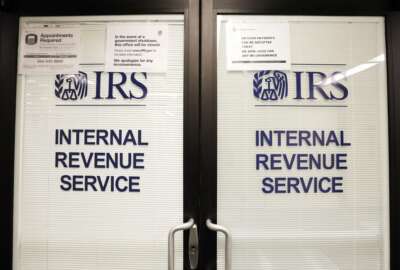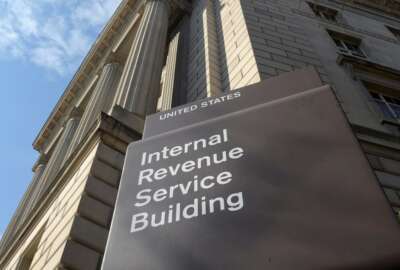

Members of Congress seized on the report's findings as a wake-up call about gaps in the oversight of emergency pandemic spending and pointed to better data-sharing...
Comptroller General Gene Dodaro knows the IRS and Treasury Department sent coronavirus stimulus payments to people who have died.
The Government Accountability Office revealed the scope of the problem Thursday in a wide-ranging report on agencies’ response to the pandemic. That review found that those agencies sent $1.4 billion in pandemic payments to more than a million people who died.

But while unpacking the specifics of the GAO report, Dodaro told members of Select Subcommittee on the Coronavirus Crisis that his mother, who died in 2018, recently received a pandemic relief check in the mail.
“My sister got it on behalf of my mother. And right on the check, it said ‘deceased.’ She sent me a picture of it. Of course, she returned it,” Dodaro told the committee Friday.
Members of Congress seized on the report’s findings as a wake-up call about gaps in the oversight of emergency pandemic spending, and have pointed to better data-sharing as a way to prevent the problem from happening again.
But GAO’s findings — and agencies’ responses — show the IRS made speed the top priority for getting pandemic payments out to the public and avoided some of the fraud checks in the first few waves of payments to get money out the door faster.
During the first three waves of pandemic payments, IRS legal counsel interpreted the CARES Act as requiring the agency to issue payments for anybody who filed a tax return in 2018 or 2019.
By the fourth wave, both the IRS and Treasury reversed course and began checking the payments against death data owned by the Social Security Administration.
“They knew they were paying people who were deceased. Then it became known publicly [and] Treasury then revaluated that position and stopped it and said ‘No, we shouldn’t be doing that, because they’re not benefitting individuals there,’” Dodaro said.
To avoid sending payments to the deceased in the fourth and subsequent waves of payments, the IRS gave Treasury and its Bureau of the Fiscal Service temporary access to the Social Security Administration’s Death Master File that includes data from states.
“It’s far-more complete than what they had before. For years, I’ve had recommendations to the Congress to pass legislation to give the Fiscal Service and Treasury access to this full Death Master File. They will stop those payments, because they have a Do Not Pay check,” Dodaro said.
Frederick Vaughan, Treasury’s principal deputy assistant secretary of the Office of Legislative Affairs, told GAO that the agency “worked with unprecedented speed to issue Economic Impact Payments to American families.”
The IRS has sent more than 160 million pandemic payments to households so far. By comparison, Vaughn said the last time the IRS took on public payments on this scale following the 2008 recession, it took the agency more than two months to make 800,000 payments.
While agencies made good progress distributing money under the CARES Act and subsequent bills, Dodaro said they’ve had limited progress meeting the transparency and accountability goals of the legislation.
“They have a high priority, given the urgency of health care needs and the severe economic downturn to move swiftly to allocate the funds,” he said. And there were trade-offs that were made, and our report is designed to help them make some mid-course corrections with regard to those trade-offs.”
After GAO released its report, Dodaro said a few people have emailed the agency asking how to return checks sent to deceased family members. The IRS has posted instructions on how to return these payments to its website, but Dodaro urged the agency to take a more “proactive approach” to notifying people.
IRS Chief Risk Officer Tom Brandt told GAO that the agency is “currently considering” its options of how best to recover some of these improper payments, but added that the agency continues to roll out services to help struggling individuals and businesses.
“Our work is not done yet as we focus on further actions to fully implement all provisions of the CARES Act, including those intended to help small businesses which have been particularly hard hit,” Brandt wrote.
Last year, Sens. Tom Carper (D-Del.) and John Kennedy (R-La.) joined Reps. Cheri Bustos (D-Ill.) and Greg Gianforte (R-Mont.) in introducing the Stopping Improper Payments to Deceased People Act, which would grant federal agencies access to the full set of the Social Security Administration death records, including state-reported death data.
Dodaro said giving more agencies access to the Death Master File would help agencies not just avoid the billion-dollar waste from pandemic checks, but it would also help chip away at the $175 billion in improper payments the federal government issued last year.
Meanwhile, the Trump administration’s fiscal 2021 budget request claims agencies specifically send $800 million in improper payments to dead people every year.
“Congress needs to pass this legislation. I think it’s very important because it’s not only the IRS stimulus payments. It could be payments for agriculture, education or whatever. There’s been legislation introduced, but it’s not been put over the goal line yet,” Dodaro said.
Carper said in a statement that the GAO report served as a “wake-up call” and underscored the need for Congress to pass the Stopping Improper Payments to Deceased People Act.
“It’s critical Americans get relief quickly, but improper payments to deceased people — especially of this magnitude in the middle of a pandemic — represent serious government waste and a burden to the people who receive them,” Carper said.
GAO’s report also raised concerns from Senate Homeland Security and Governmental Reform Committee Ranking Member Gary Peters (D-Mich.) who highlighted the agency’s findings in the committee’s own report and urged Congress to “take immediate steps to address this wasteful spending.”
“The federal government has consistently failed to address problems that have led to sending mistaken payments to deceased people, and I have long advocated for commonsense measures that would prevent many of these wasteful payments and save taxpayer dollars,” Peters said.
Meanwhile, the IRS also faces challenges getting pandemic relief payments to people who earn $12,000 or less annually because they typically aren’t required to file a tax return.
Dodaro said the IRS and Treasury need to explore different data sources to identify these individuals. GAO, he added, submit recommendations on the issue to both agencies.
Copyright © 2025 Federal News Network. All rights reserved. This website is not intended for users located within the European Economic Area.
Jory Heckman is a reporter at Federal News Network covering U.S. Postal Service, IRS, big data and technology issues.
Follow @jheckmanWFED



